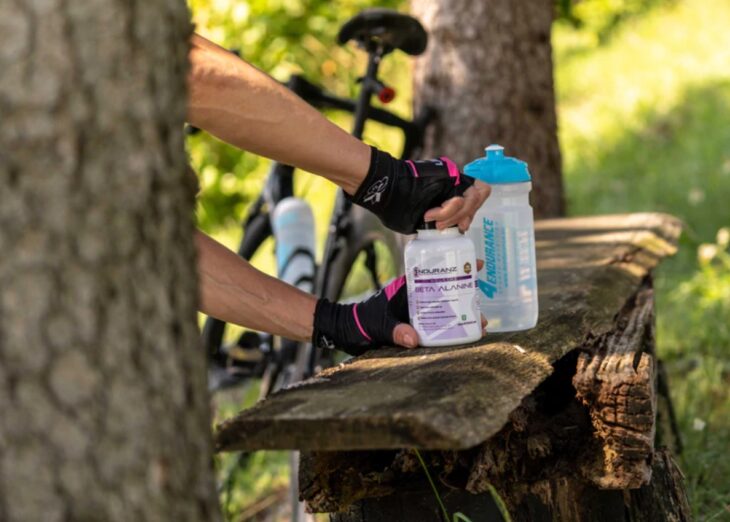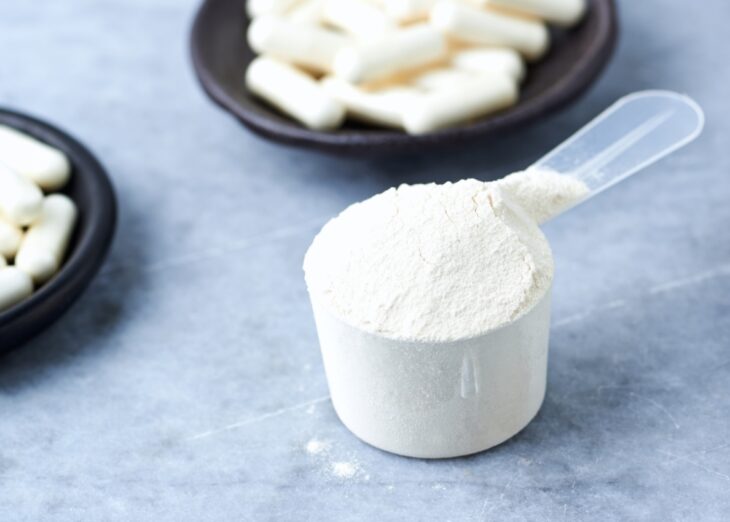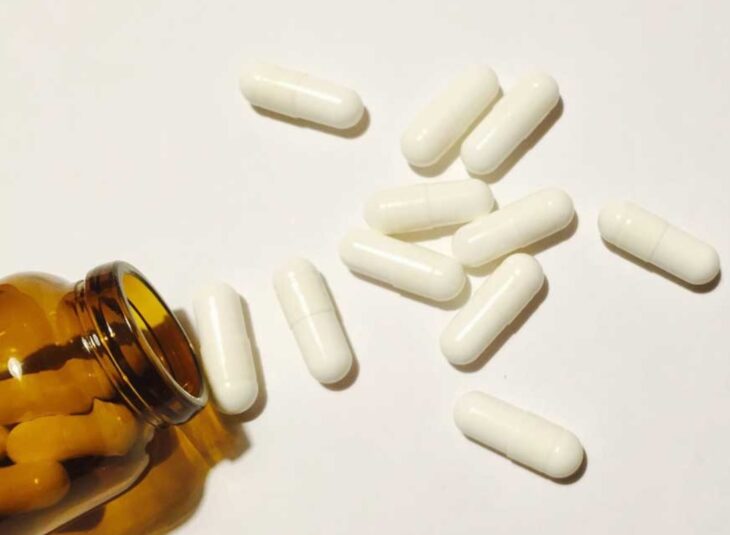Have you ever wondered how fast you would cycle if there were a supplement that would increase your athletic performance and delay fatigue? Well, there is good news for you. Beta-alanine can deliver just that. Scientific studies have shown that by counteracting lactic acid production, beta-alanine improves athletic performance and endurance by increasing the workout volume and delaying fatigue.

Source: 4endurance.net
Contents
What is beta-alanine, and how does it function?
Beta-alanine is a non-essential amino acid that the body synthesizes naturally, and it combines with histidine to form carnosine stored in your muscles. When you work out, the carnosine acts as a buffer against muscle acidosis, the primary cause of fatigue during training or intense workouts. As a result, that delays muscle fatigue and extends the time to exhaustion, allowing you to work out for longer times without getting tired.
However, the level of carnosine in your body depends on your beta-alanine levels, which is also rate limiting which means that it limits the carnosine your body can produce. Therefore, if you have more beta-alanine in your body, it can synthesize more carnosine which is why many athletes supplement it.

Source. elo.health
Is beta-alanine good for cyclists?
Since beta-alanine indirectly helps buffer muscle acidosis, there are so many reasons why it would be beneficial for cyclists. Several studies have shown that supplementing with CarnoSyn®, the patented form of beta-alanine, boosts your muscle carnosine level concentrations and counteracts the accumulation of lactic acid.
A study that examined the impact of muscle carnosine levels showed high-intensity cycling capacity after every 24weeks of beta-alanine supplementation in cyclists. The good thing is that the benefits of beta-alanine have been extensively studied and demonstrated significant benefits.
7 Benefits of beta-alanine for cyclists
1. It boosts muscle carnosine content
According to a study, competitive cyclists supplemented with carnosine beta-alanine demonstrated a 58% increase of carnosine levels at four weeks and 80% at ten weeks of supplementation. In a different study, several competitive sprint athletes showed increased carnosine levels after four weeks of supplementation with beta-alanine.
When you introduce more beta-alanine to your bloodstream and muscle tissues, that results in delayed fatigue times and more training capacity, increasing your overall workout volume. As a cyclist, you should supplement with beta-alanine both on training and non-training days to build up your carnosine muscle saturation over time and benefit from improved cycling performance.

Source: linkedin.com
2. It increases endurance and peak performance
Carnosyn has also demonstrated great benefits for cyclists regarding muscle endurance and peak performance. According to research, cyclists supplemented with beta-alanine for eight weeks showed an 11.4% increase in peak power output while several highly trained rowers increased their rowing speed by 4.3seconds over 2000meters.
That shows the impact of beta-alanine in terms of endurance and peak performance. With more carnosine levels in your muscles, you can cycle faster without getting tired, allowing you to increase your peak performance and competitiveness.
3. It boosts the workout volume
Workout volume refers to the total amount of performance you complete in a given time. A group of men and women were supplemented with beta-alanine for 28days. There was a 16.9% increase in the physical capacity of men and a 12% increase in women.
That indicates that supplementing with beta-alanine boosts your workout volume, resulting in better performance, more strength gains, endurance, and optimized body composition. The ability to do more when cycling results in better performance.

Source: cyclingweekly.com
4. It delays muscle fatigue
According to another study, carnosine supplementation led to improved workout duration in a group of 48cyclists. The researchers suggested that the enhanced workout duration was caused by high carnosine levels in the muscles, which delayed fatigue in the athletes.
Cycling involves using your leg muscles, and fatigue is what causes low performance. As earlier mentioned, beta-alanine is self-limiting in the body, which directly impacts the level of carnosine in your muscles. Therefore by supplementing with beta-alanine, you increase your carnosine levels. The carnosine works against muscle acidosis by delaying the accumulation of lactic acid, which causes fatigue hen cycling.
5. It reduces neuromuscular fatigue
Multiple studies have shown that supplementing with beta-alanine significantly reduces neuromuscular fatigue. One specific study demonstrated more than 11% increased sprint power after beta-alanine supplementation in competitive cyclists. This effect narrows down to the effect of carnosine on the anaerobic energy system.
Naturally, when you indulge in moderate to high-intensity workouts, the body converts glucose to pyruvate and ATP. However, some of the pyruvate is also used to synthesize ATP, and as it converts, your body produces lactate as hydrogen ions. So the more you cycle, the more lactate you make and the more hydrogen ions, which reduce muscle PH leading to a burning sensation on your muscles.
Carnosine plays a significant role in buffering those hydrogen ions. So the goal of supplementation with beta-alanine is to increase the carnosine levels and significantly reduce muscle PH. Generally, beta-alanine supplementation enhances the effect of high-intensity training and significantly reduces neuromuscular fatigue, which is beneficial to cyclists.

Source: healthline.com
6. It reduces mental fatigue and boosts focus.
Another impressive benefit of beta-alanine for cyclists is improving mental focus. According to studies, supplementing with carnosine boosts mental clarity and your brain’s executive functioning, which positively impacts your training sessions. It is easy to lose focus when training due to fatigue but a high carnosine level has a positive effect.
7. It improves strength
Lastly, beta-alanine supplementation results in more strength, which is vital for cyclists in endurance and improved performance. Further studies have shown that combining beta-alanine with creatine, a workout supplement, resulted in a significant strength increase for cyclists and other athletes.

Source: bicyclingaustralia.com.au
The bottom line
Beta-alanine is a reasonably researched supplement in improving endurance, delaying fatigue, and boosting performance in cyclists. It increases your carnosine levels which buffers muscle acidosis reducing fatigue. If beta-alanine helps buffer muscle acidosis, it is beneficial for cyclists under specific conditions. Since gathering enough carnosine levels to see an effect takes a while, you should supplement beta-alanine for weeks, if not months, to see tangible results. Also, ensure you use carnosyn, the patented form of beta-alanine.
